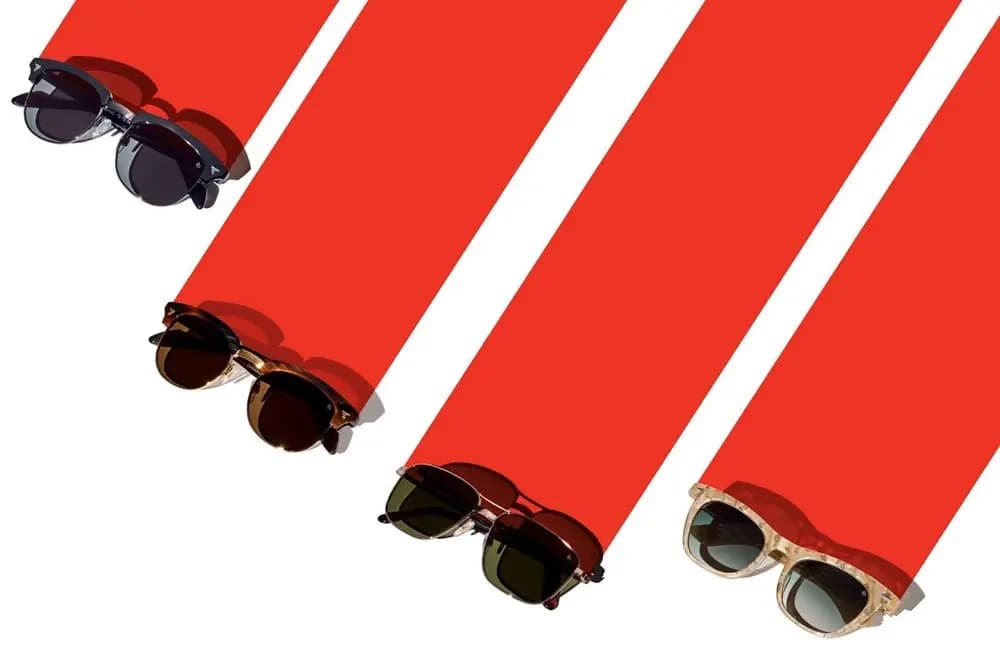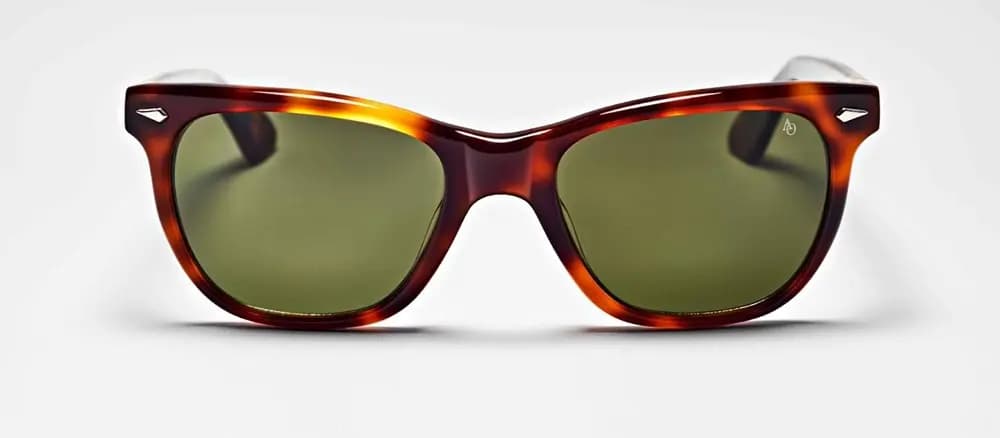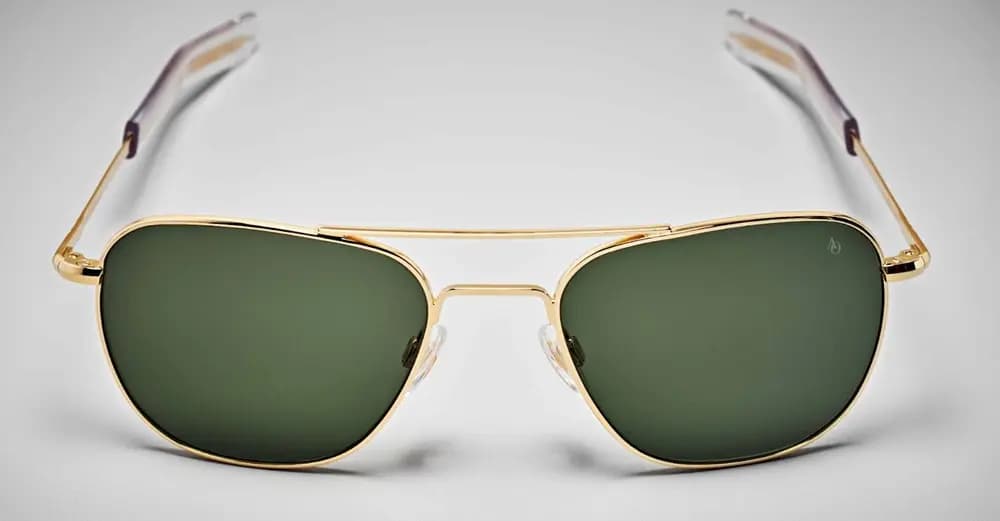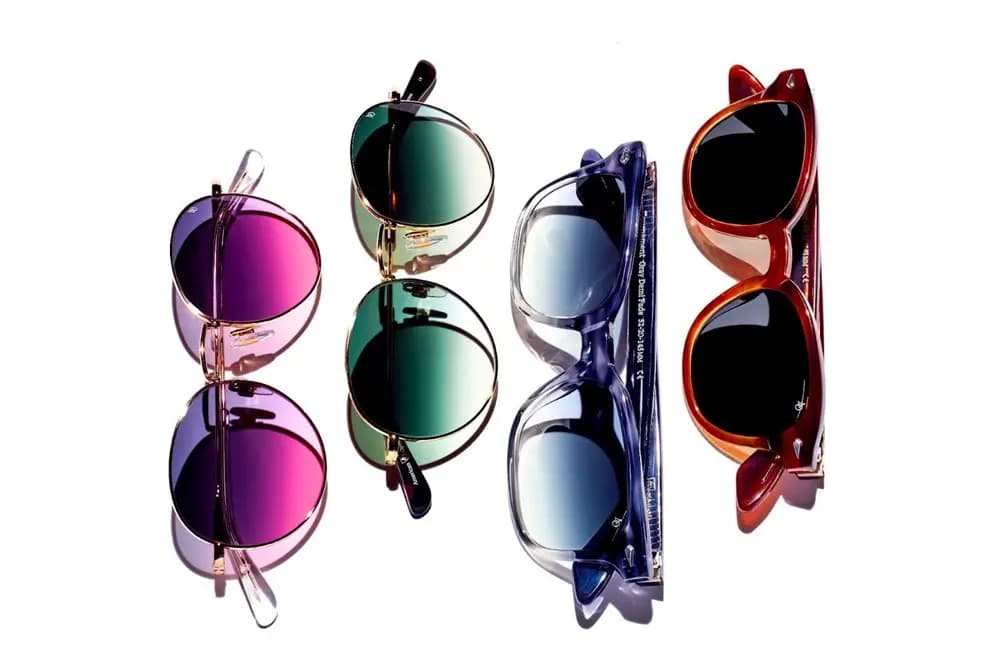
Material Matters: Acetate vs. Metal Frames in Sunglasses

Overview of Acetate Frames

Acetate sunglasses frames, crafted from a type of plant-based plastic known as cellulose acetate, are known for their aesthetic flexibility. These frames, a durable option in the world of eyeglasses, are associated with lightweight comfort and hypoallergenic properties, making them ideal for individuals with sensitive skin. The rich patterns and styles available in acetate frames make them a favorite for those seeking both style and wearability.
Advantages of Acetate Frames
Acetate, a popular frame material in eyewear, offers several benefits for glass wearers.
These include:
- Fashion and functionality: Blending practicality with style, acetate frames are a standout choice in eyewear.
- Color and design range: A wide array of colors and patterns enhances style versatility and allows for a personalized fit.
- Durability: Acetate frames are known for their robustness, making them a durable option for long-term use.
- Flexibility: Their flexibility allows for professional frame adjustments and reduces the chances of breakage, adding to their longevity
- Ideal for prescription lenses: Sturdy and stylish, acetate frames are excellent for those requiring prescription lenses.
Disadvantages of Acetate Frames
While acetate frames have many advantages, they also have some drawbacks to consider:
- Heat sensitivity: These frames can warp or lose their shape if regularly exposed to very high temperatures.
- Sunlight exposure risks: Prolonged exposure to sunlight may lead to discoloration or alteration in color and pattern over time.
- Cost comparison: Compared to standard plastic frames, acetate frames tend to be more expensive, albeit offering superior quality, durability, and a wider range of style options.
Overview of Metal Frames

Metal sunglasses frames, comprising various types of metals like stainless steel, titanium, and sometimes memory metal, offer a sleek, minimalist look. They’re known for their strength and durability, making them a popular choice among spectacle frames. After all, the Original Pilot was strong enough to go to the moon. Metal frame materials like pure titanium are especially valued for their lightweight nature and hypoallergenic properties so they are ideal for those with nickel allergies.
Advantages of Metal Frames

Metal frames, used in a variety of eyewear including glasses and sunglasses, offer several key benefits:
- Durability: Metal frames are known for their longevity, so they’re a preferred choice for those looking for eyewear that lasts.
- Lightweight nature: Generally lighter than plastic eyeglass frames, metal frames provide greater comfort for extended wear.
- Adjustable nose pads: The inclusion of adjustable nose pads in metal frames ensures a more easily customized fit, a crucial feature for those needing to accommodate thicker lenses.
- Style variety: Offering a sleek and modern aesthetic, metal frames cater to a minimalist look while maintaining functionality.
Disadvantages of Metal Frames
Despite their advantages, metal frames also have some drawbacks:
- Allergy concerns: Metal frames can cause reactions in individuals with metal allergies, especially those sensitive to materials like nickel.
- Color limitations: Compared to acetate or plastic frames, metal frames often have fewer color options, limiting style choices.
- Corrosion risk: Some metals used in frames have the potential to corrode over time, which can affect both the appearance and the structural integrity of the frames. American Optical frames are electro-coated to prevent corrosion and reduce the risk of allergic reactions.
- Flexibility and comfort: While they are durable, metal frames may not offer the same level of flexibility and comfort as some plastic materials, which can be a consideration for daily wear.
Factors to Consider when Choosing Frame Material

When it comes to selecting the perfect frames for your eyeglasses or sunglasses, the choice between acetate and metal frames isn't just about aesthetics; it's about balancing various key factors to find the best fit for your lifestyle and needs.
Here are some detailed considerations to help you compare these two types of eyeglass frames:
| Factor | Acetate Frames | Metal Frames | Comparison Tip |
|---|---|---|---|
| Durability | Known for their robustness, can withstand daily wear and tear quite well. | Tend to be very durable, with some metals like titanium known for exceptional strength. | Consider your daily activities. Durable metal might be preferable for sports or outdoor activities. Acetate could be sufficiently durable for regular use. |
| Comfort and Weight | Generally lightweight, though some designs might feel heavier. | Often lighter than acetate, with added comfort due to adjustable nose pads. | Try on both types to see which feels more comfortable, especially for long periods. |
| Style and Aesthetics | Offer a wide variety of colors and patterns for a more personalized look. | Provide a sleek, minimalist style, typically in more subdued colors. | Think about your personal style. Do you prefer bold and expressive (acetate) or sleek and sophisticated (metal)? |
| Sensitivity to Materials | Hypoallergenic, making them a safe choice for sensitive skin. | Can cause allergic reactions in some people, especially frames containing nickel. | If you have skin sensitivities, acetate might be the safer bet. |
| Weight and Shape Retention | Can warp with heat and might not retain shape as well as metal. | Better at retaining shape over time, even with exposure to different conditions. | Consider your environment and how you store your glasses. Metal frames might be more resilient in varied conditions. |
The decision between acetate and metal frames involves a thoughtful comparison of these factors. It's not just about which material is better overall, but which is better for you personally. You can also consider trying on both types in a store to get a real feel for their differences. Many people opt to keep a go-to metal and acetate pair for styling flexibility.
Acetate or Metal? Make the Easiest Decision with AO Eyewear!

Whether your preference leans towards the vibrant and diverse aesthetics of acetate frames or you favor the enduring strength and minimalist elegance of metal frames, the key lies in selecting a pair that aligns with both your functional needs and style preferences. Remember, the ideal frame material for your sunglasses isn't just about the immediate appeal — it's about striking a balance between aesthetics and practicality. This ensures that your eyewear not only enhances your appearance but also provides comfort and longevity.
For a diverse selection of quality eyewear that caters to all these needs, explore American Optical Eyewear. Discover the perfect blend of style, comfort, and durability in our extensive collection, designed to complement your lifestyle and preferences.
Sign up & save $10
Sign up to our newsletter and be the first to know about new, limited edition AO products, events and $10 off your first order!








